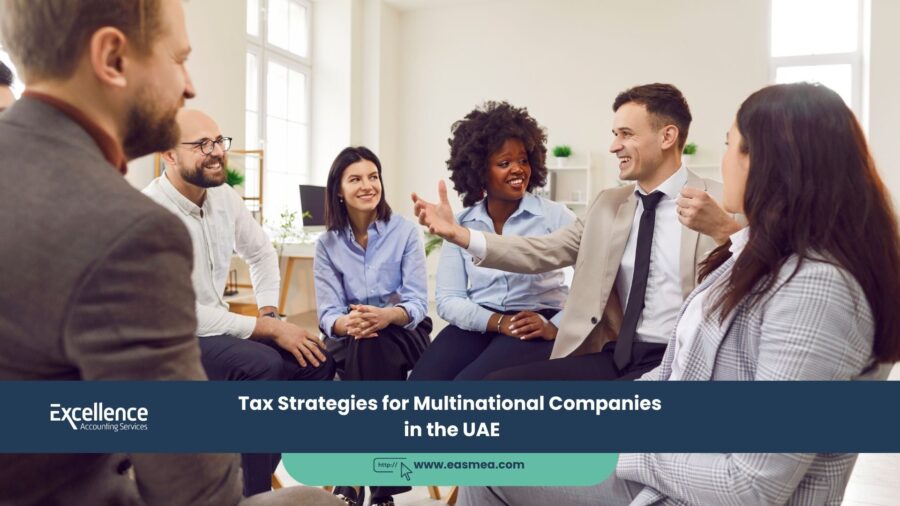Tax Strategies for Multinational Companies in the UAE
The United Arab Emirates has long cemented its status as a premier global business hub, attracting multinational companies (MNCs) with its strategic location, world-class infrastructure, and historically tax-friendly environment. The introduction of a federal Corporate Tax (CT) regime marks the most significant evolution in this landscape. For MNCs, this is not merely a new compliance requirement; it is a strategic inflection point that demands a sophisticated re-evaluation of their operational and financial structures within the UAE and across the wider region.
- Tax Strategies for Multinational Companies in the UAE
- Part 1: The New Paradigm - 9% Corporate Tax Meets Pillar Two
- Part 2: Transfer Pricing - The Critical Compliance Frontier
- Part 3: Corporate Structuring for Efficiency and Compliance
- Part 4: Managing Cross-Border Transactions and Financing
- What Excellence Accounting Services (EAS) Offers to MNCs
- Frequently Asked Questions (FAQs) for MNCs
- Navigate Global Tax with Local Expertise.
Navigating this new era requires more than just an understanding of the 9% tax rate. It involves a deep dive into the interplay between UAE domestic law and global tax initiatives like the OECD’s Pillar Two framework. Success hinges on a proactive and integrated approach to transfer pricing, corporate structuring, treasury functions, and leveraging the unique advantages that the UAE continues to offer, such as its extensive tax treaty network and the benefits of its free zones. This guide provides a strategic overview for finance leaders and tax directors of MNCs, outlining the key considerations and advanced strategies for optimizing their tax position while ensuring robust compliance in the UAE’s dynamic new tax environment.
Key Takeaways for MNC Tax Strategy in the UAE
- Pillar Two is Paramount: For MNCs with revenues over €750M, UAE’s 9% CT rate must be analyzed in the context of the 15% global minimum tax, influencing structuring and profit allocation.
- Transfer Pricing is the Core Compliance Risk: Robust transfer pricing policies and contemporaneous documentation (Master File/Local File) are non-negotiable to defend intercompany transactions.
- Tax Groups Offer Significant Efficiencies: Forming a Tax Group allows for consolidated returns, simplified reporting, and the ability to offset profits and losses within the group.
- Free Zones Remain Strategically Important: The Qualifying Free Zone Person (QFZP) regime still offers a 0% CT rate on qualifying income, making it a powerful tool for specific business activities.
- Withholding Tax (WHT) Advantage: The UAE’s continued 0% WHT on dividends, interest, and royalties makes it a highly attractive location for holding companies and regional headquarters.
Part 1: The New Paradigm – 9% Corporate Tax Meets Pillar Two
The headline rate of 9% on taxable income exceeding AED 375,000 positions the UAE as a competitive tax jurisdiction. However, for MNCs falling within the scope of the OECD/G20’s Pillar Two Global Anti-Base Erosion (GloBE) rules—those with consolidated revenues exceeding €750 million—the analysis is far more complex.
Understanding the Interplay
Pillar Two aims to ensure that large MNCs pay a minimum effective tax rate (ETR) of 15% on the income arising in each jurisdiction where they operate. If the ETR in a jurisdiction like the UAE is below 15%, other “top-up” taxes may be imposed by other countries where the MNC operates.
Strategic Implication: The goal for an in-scope MNC is not simply to achieve a 9% tax rate in the UAE, but to manage its UAE operations in a way that results in an ETR of at least 15% to avoid tax leakage elsewhere. This may involve forgoing certain UAE tax incentives or re-evaluating profit allocation to ensure the 15% threshold is met efficiently. A thorough business valuation and profit analysis is the starting point for this assessment.
Part 2: Transfer Pricing – The Critical Compliance Frontier
For MNCs, the most significant compliance challenge and area of tax risk is undoubtedly Transfer Pricing (TP). UAE’s new CT law has formally adopted the arm’s length principle, requiring all transactions between related parties to be priced as if they were between independent entities.
Key Focus Areas for MNCs:
- Robust TP Policies: MNCs must have a clear, documented policy outlining how intercompany transactions (e.g., services, financing, sale of goods, use of intellectual property) are priced.
- Contemporaneous Documentation: You are required to prepare and maintain a Master File (providing a high-level overview of the group’s global operations) and a Local File (detailing the specific UAE entity’s related party transactions). This documentation must be submitted to the FTA upon request.
- Selection of the Right TP Method: The law recognizes the five standard OECD methods (CUP, Resale Price, Cost Plus, TNMM, Profit Split). Justifying the chosen method is as important as the price itself.
- Intercompany Financing: Loans, cash pooling, and guarantees must be priced at arm’s length interest rates, and the level of debt must be commercially justifiable.
Managing transfer pricing effectively requires a blend of legal understanding, economic analysis, and meticulous accounting and bookkeeping. It is the cornerstone of a defensible tax position.
Part 3: Corporate Structuring for Efficiency and Compliance
How an MNC structures its UAE presence has profound tax implications. The UAE offers several powerful structuring tools that can be used to optimize tax outcomes.
1. Forming a Tax Group
MNCs with multiple entities in the UAE can benefit significantly from forming a Tax Group. A parent company and its UAE subsidiaries (where the parent owns at least 95% of the shares) can elect to be treated as a single taxable person.
Benefits of a Tax Group:
- Consolidated Filing: The parent company files a single tax return on behalf of the entire group.
- Loss Offset: Losses from one group company can be automatically offset against profits from another, reducing the group’s overall cash tax liability.
- Simplified Intercompany Transactions: Transactions between members of the tax group are eliminated and disregarded for CT purposes.
Our detailed guide on Structuring Tax Groups provides a deeper analysis of this strategy.
2. Leveraging the Qualifying Free Zone Person (QFZP) Regime
Free Zones have not lost their appeal. The QFZP regime allows a Free Zone entity to benefit from a 0% CT rate on its “Qualifying Income.”
Qualifying Income generally includes:
- Income from transactions with other Free Zone entities.
- Income from exporting goods or services to businesses outside the UAE.
- “Qualifying” activities such as manufacturing, logistics, and certain headquarters services.
For MNCs, this makes Free Zones ideal for specific functions like regional distribution hubs, manufacturing centers, or group service centers. However, strict substance requirements and adherence to the arm’s length principle for any transactions with mainland group entities are essential. A feasibility study is crucial before establishing a QFZP.
3. Using the UAE as a Holding Company Location
The UAE is an excellent jurisdiction for a regional or global holding company due to:
- Participation Exemption: Dividends and capital gains from qualifying shareholdings (generally 5% or more, held for at least 12 months) are exempt from UAE CT.
- 0% Withholding Tax: The UAE does not levy withholding tax on dividend payments made by the holding company to its overseas parent.
- Extensive Double Tax Treaty Network: Reduces or eliminates withholding taxes on dividends received by the UAE holding company from its subsidiaries in other countries.
Part 4: Managing Cross-Border Transactions and Financing
Beyond structuring, the management of day-to-day cross-border flows is critical.
Foreign Tax Credits
If a UAE company pays tax in another country (e.g., a withholding tax on a service fee), it can claim a Foreign Tax Credit to reduce its UAE CT liability. This credit is limited to the amount of UAE CT that would be due on that same income. This prevents double taxation and is a vital mechanism for global businesses.
Business Restructuring and M&A
The UAE CT law includes provisions for tax-neutral reorganizations. The tax implications of business restructuring can be managed effectively with features like:
- Qualifying Group Relief: Allows for the transfer of assets and liabilities between group companies at their net book value without triggering a taxable gain.
- Business Restructuring Relief: Facilitates mergers, spin-offs, and demergers on a tax-neutral basis.
For any M&A activity, comprehensive tax due diligence is now more critical than ever to identify any historical tax liabilities or structural inefficiencies in the target company.
The Role of a Centralized System
For a UAE subsidiary of an MNC, maintaining impeccable local records is vital for group reporting. A system like Zoho Books can provide a cost-effective solution for local compliance, ensuring that accounts payable, accounts receivable, and financial data are accurately captured. This clean local data can then be seamlessly integrated into the MNC’s global ERP and consolidation systems.
What Excellence Accounting Services (EAS) Offers to MNCs
Excellence Accounting Services provides a suite of high-level advisory services designed to meet the complex needs of multinational companies operating in the UAE’s new tax landscape.
- International Tax & Pillar Two Advisory: We help you analyze the impact of the global minimum tax on your UAE operations and structure your affairs to achieve an optimal group-wide ETR.
- Transfer Pricing Services: Our experts assist with developing and defending TP policies, preparing Master File and Local File documentation, and performing benchmarking studies.
- Corporate Structuring & Restructuring: We advise on the optimal legal and tax structure for your UAE presence, including holding company setup, Free Zone optimization, and forming Tax Groups.
- M&A Tax Due Diligence: Our team conducts rigorous tax due diligence to identify and mitigate risks in any acquisition or merger.
- Outsourced CFO & Financial Reporting: Our strategic CFO services provide high-level financial oversight and ensure your UAE entity’s financial reporting is compliant with both local law and group standards.
- Comprehensive Audit Support: We leverage our expertise in both internal audit and external audit support to prepare you for and represent you during any FTA inquiries.
Frequently Asked Questions (FAQs) for MNCs
The UAE’s participation exemption is highly competitive. The key conditions—a 5% ownership stake and a 12-month holding period—are in line with or more favorable than those in many established holding jurisdictions. Furthermore, the subsidiary must be subject to a corporate tax rate of at least 9%, which is a broad and achievable condition.
The main issue is creating a potential “Permanent Establishment” (PE) for the foreign entity in the UAE, which could subject its profits to UAE CT. You also need a clear recharge mechanism for the employee costs, which must be at arm’s length. This often requires a formal secondment agreement and a supporting transfer pricing analysis. Proper management through HR consultancy is crucial.
Yes. The UAE has introduced a general interest limitation rule. The deductibility of net interest expense is capped at 30% of the business’s EBITDA (Earnings Before Interest, Tax, Depreciation, and Amortization). This is designed to prevent excessive debt financing to erode the tax base and is a key consideration for treasury functions.
Yes, a Qualifying Free Zone Person can be a parent company of a Tax Group. However, if it joins a Tax Group with mainland entities, the QFZP itself (and all other members) will become subject to the standard 9% Corporate Tax rate on all its income and will lose its 0% benefit.
Foreign exchange gains and losses are generally treated as taxable income or deductible expenses on a realization basis. However, an MNC can elect to apply the realization principle to its financial statements, which may be more aligned with its group accounting policies. The key is consistency in the chosen method.
While the old Economic Substance Regulations (ESR) have been absorbed into the CT regime, the principle remains. A UAE entity, especially a holding or IP company, must have adequate substance. This means having qualified employees, physical office space, and active management and decision-making taking place within the UAE. The days of “brass plate” companies are over.
The GAAR allows the FTA to disregard any transaction or arrangement where one of the main purposes was to obtain a tax advantage that defeats the object of the law. This means that any aggressive tax planning that lacks commercial substance can be challenged. All strategies must be supported by genuine business and economic reasons.
Yes, the UAE CT law includes provisions for taxpayers to enter into APAs with the Federal Tax Authority. An APA provides certainty on the treatment of a taxpayer’s related party transactions for a specified period. For MNCs with significant and complex intercompany dealings, this can be a valuable tool to mitigate tax risk.
Even for an in-scope MNC, a QFZP can still be beneficial. While the group’s overall ETR needs to reach 15%, the 0% rate on specific qualifying income in the QFZP can be blended with the 9% rate on other UAE income. This can help manage the overall cash tax paid in the UAE, even if a top-up tax is ultimately payable elsewhere. It provides flexibility in managing the group’s global tax profile.
Costs recharged from a regional HQ in the UAE must be allocated to the recipient entities based on a clear and justifiable allocation key (e.g., based on revenue, headcount, or time spent). The recharged amount must be at arm’s length and reflect the benefit received by the subsidiary. This requires a robust cost allocation study and is a common focus area in transfer pricing audits.
Conclusion: A New Chapter of Strategic Engagement
The UAE’s corporate tax regime has ushered in a new era of strategic financial management for multinational companies. The landscape is now one of immense opportunity, but it is layered with complexity that demands global awareness and local expertise. Proactive strategies centered around robust transfer pricing, intelligent corporate structuring, and a clear understanding of the global tax context are no longer optional—they are essential for sustainable growth. By embracing this new reality and partnering with expert advisors, MNCs can continue to leverage the UAE’s unique advantages as a world-class business hub, ensuring both compliance and competitive advantage for years to come.




